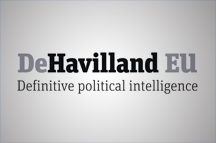 The Digital Single Market strategy enters treacherous waters in the autumn of 2015, as the Commission attempts to successfully launch a number of initiatives foreseen in the nascent digital package announced in May.
The Digital Single Market strategy enters treacherous waters in the autumn of 2015, as the Commission attempts to successfully launch a number of initiatives foreseen in the nascent digital package announced in May.
Indeed, a number of important dates are approaching for a range of measures promised by the Commission, starting with imminent proposals on copyright reform. Further initiatives have been earmarked for unveiling before the end of the year. Either way, the EU is heading for an intensive period for digital policy.
In light of this, DeHavilland EU has published a new white paper providing an overview of the most important digital issues to be tackled by the EU in the DSM strategy. Download the white paper online here.
New update available
The DSM strategy as proposed in May sets out to respond to a number of issues affecting citizens and businesses across a variety of sectors, and the strategy contains several measures to update an aging legislative framework.
The challenge for the Commission in this area has and continues to be producing policy that manages to successfully update legislation while pleasing stakeholders on all sides in policy areas that have often proved some of the most controversial in the EU, including respect for diversity of culture and fundamental rights to privacy.
For the DSM strategy to successfully get off the ground, the Commission has engaged in an intensive period of consultation in order to get the balance right, with a number of consultations published by the Commission over the summer months.
File corrupted
On copyright specifically this process is a little further along the line, with extensive consultation held under the previous Commission of José Manuel Barroso. Indeed, Digital Commissioner Günther Oettinger felt ready to announce as early as 2014 that copyright reform would be on the table by September 2015.
As might be perhaps indicated by this first missed deadline, the task has not proven to be as simple as first anticipated. Disagreements over the speed and breadth of reform that reportedly had ex-Commissioners Neelie Kroes and Michel Barnier at loggerheads during the Barroso Commission have returned to the Juncker Commission.
This has most notably been witnessed in the differences in language and approach to territoriality – the geographical limitation of rights to the Member State granting them – and the closely-related issue of geoblocking.
Whereas the focus of the Commission and of Vice-President for the Digital Single Market Andrus Ansip has been on cross-border demand for audiovisual content, Commissioner Oettinger has gone on record as stating that the EU “should not throw away the baby with the bath water” and called for due attention to be given to the European film industry.
Pushback has also been witnessed from the Member States. France argued early that any reform should focus on portability of content, whereas the UK has proven less enthusiastic on the issue following the launch of a competition inquiry into UK pay TV.
The outcome of this disagreement and the required balancing act is yet to be seen, with further delay a possibility. It is likely that the eventual proposals could focus solely on some of the less controversial elements announced in the DSM strategy, such as exceptions for the disabled and text and data mining.
Whatever happens, the proposal on copyright reform will represent the first real test of the DSM strategy, and whether the Commission will be able to successfully navigate the testing waters of autumn 2015 will have a major impact on the overall success of the strategy as a whole.
DeHavilland EU Open Content Week
For further coverage and analysis of the Digital Single Market and all other EU digital developments, sign up for our complimentary Open Content Week, from 12 - 16 October.















